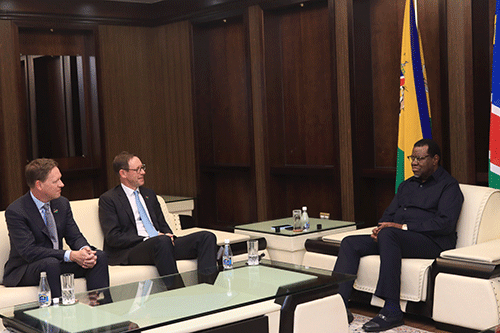The outgoing De Beers Group CEO, Bruce Cleaver, said the joint venture partnerships they have with Botswana and Namibia in the finding and sorting of rough diamonds are fair deals for both countries.
Cleaver, who paid a courtesy visit to President Hage Geingob yesterday to introduce his successor Al Cook, said he has confidence that the joint venture will yield good results for the two countries and for any other country that would want to join.
President Geingob welcomed the management delegation; however, he said the discussion involving diamonds is “secret”; hence, it was done behind closed doors.
De Beers is in talks with the Botswana government to extend mining rights that expire in 2029, as well as a 2011 diamond sales agreement that expires in June this year.
A joint venture between Anglo-American unit De Beers and Botswana’s government, Debswana sells 75% of its output to De Beers, with the balance taken up by the state-owned Okavango Diamond Company.
In 2021, Namdeb, a joint venture between Namibia and De Beers, extended its land-based mines’ life by 20 years to 2042 – thanks in part to a mineral royalty discount.
Under the previous business plan, the land-based Namdeb mines would have come to the end of their life in 2022. De Beers also mines diamonds offshore Namibia through its Debmarine Namibia unit.
As part of the deal, Namibia offered Namdeb royalty relief from 2021 to 2025, with the royalty rate cut to 5% from 10%. Diamond mining is the largest source of tax revenue in Namibia, and it generates 20% of the country’s export earnings.
Botswana president Mokgweetsi Masisi recently said his government is prepared to walk away from negotiations with De Beers if he is not satisfied with the division of revenues from the diamond trade. Speaking at a ruling party rally near Gaborone, Masisi described the ongoing talks with De Beers as “shaking a giant”, and added the country was resolute in its position.
Last year, Debswana’s diamond sales hit a record US$4.5 billion, compared to US$3.4 billion in 2021.
Diamond sales, almost entirely from Debswana, account for two-thirds of Botswana’s foreign currency receipts and a fifth of its gross domestic product.
“These are our diamonds, and we want a larger share for us – but through negotiations,” Masisi said.
“If it gets difficult and talks fail, we will have to say, ‘Let’s go our separate ways,” said Masisi, quoted by News24.
However, Cleaver assured the deal is fair and will highly benefit and satisfy all parties involved.
“I am very confident that this is a win-win situation because Botswana takes 80 cents in every dollar we make, and we take 20 of the generated money,” he explained.
– ljason@nepc.com.na



